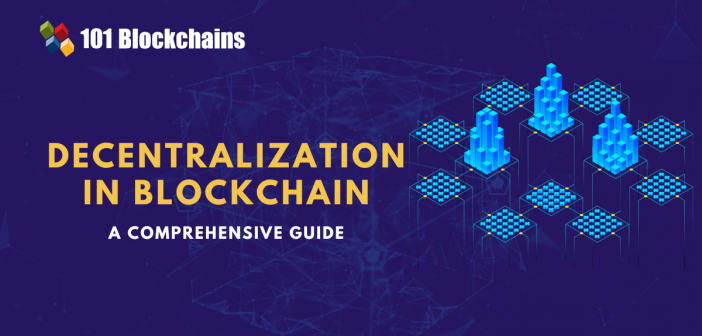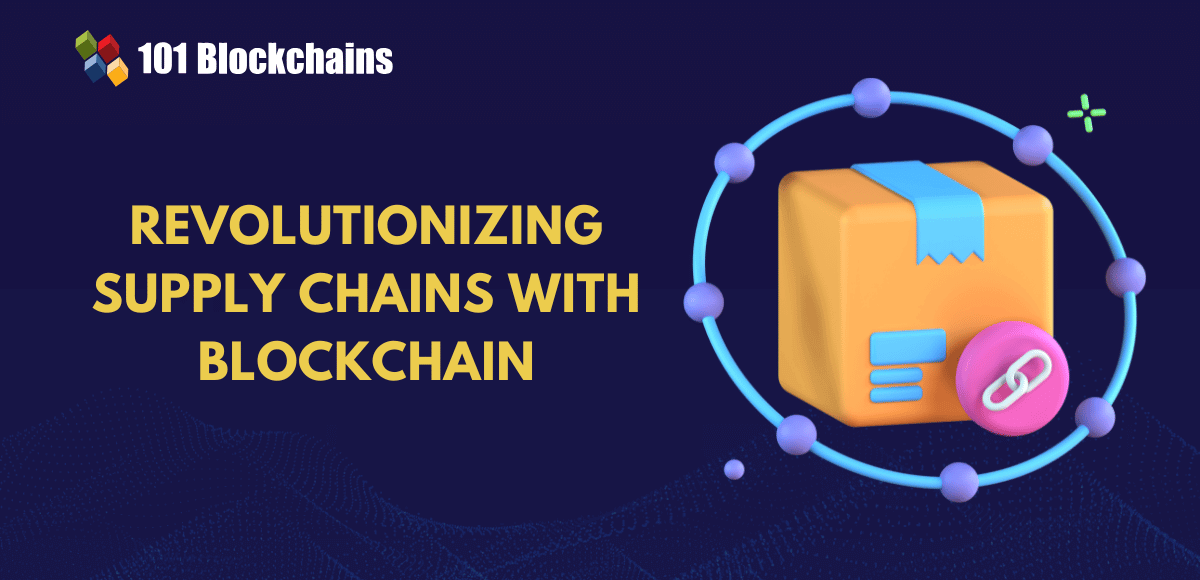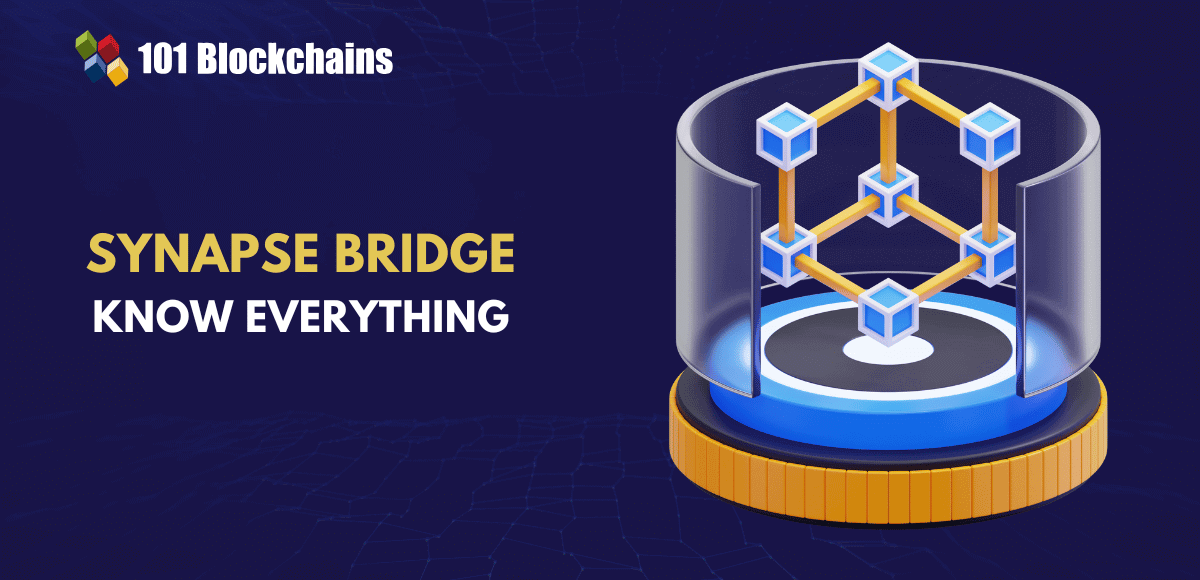Learn how blockchain truly works, master key definitions, and uncover what makes smart contracts so "smart." Dive into the fundamentals, gain valuable insights, and start your blockchain journey today!

- Blockchain
Georgia Weston
- on October 26, 2022
What is Decentralization in Blockchain?
Looking back at the history of technological advancements, it is reasonable to believe that we have come a long way since the arrival of the internet. The internet is evolving and trying to become more conducive for users. However, computers and models behind the internet we see today are a long way from processing data and communicating them to users.
Most importantly, the internet and the collection of digital services you find on it are under the control of big companies. This is where the concept of decentralization in blockchain serves a vital role in defining an important change for the future of technology. The following discussion aims to present an explanation for decentralization and how it serves notable value benefits. In addition, you can also learn about how decentralization works through different methods.
Build your identity as a certified blockchain expert with 101 Blockchains’ Blockchain Certifications designed to provide enhanced career prospects.
Where did Decentralization Come From?
Many people must have curiosity regarding the reasons for the sudden growth in the popularity of blockchain technology and decentralization. Blockchain introduced the concept of peer-to-peer digital tools that can help in distributing power and information alongside opening new roads for collaboration. The benefits of decentralization blockchain depend on the peer-to-peer model, which takes away the authority of single or external powers.
Blockchain established the concept of running the network in accordance with a specific set of rules decided by the network members. You can notice how decentralization is an inherent trait of blockchain technology. As a matter of fact, the primary value proposition of blockchain technology involves better efficiency, equitability, and transparency in the exchange of value and information. Decentralization delivers the ideal foundation for the value benefits of blockchain, fuelling collaboration and removing centralized authorities.
Decentralization in Blockchain
You can find better clarity regarding “What is decentralization in blockchain?” with an overview of how blockchain works. Almost everyone in the tech world knows about blockchain, and it has spurred a massive assortment of applications in different domains. As the name implies, a blockchain is a chain of consecutive blocks attached to each other.
Each block contains records of multiple transactions on a specific application. Users of the network must agree on the validity of transactions before adding them to the blocks. From the simplest perspective, you can assume one transaction as one block on a specific blockchain network. The working of blockchain involves attaching blocks to each other through hashing, a process that makes it impossible to introduce any change in one block.
Curious to learn about blockchain implementation and strategies? Enroll Now in Blockchain Technology – Implementation And Strategy Course!
How Does Decentralization Work?
The need for consensus among the network users and independence for conducting transactions without centralized intervention is a striking highlight of blockchain. However, anyone would ask, “Is blockchain really decentralized” with the requirement of validation from a group of users on the blockchain network. Let us dive deeper into the anatomy of a transaction on the blockchain to learn the definition of decentralization effectively.
The new transaction on a specific blockchain network, such as the Bitcoin blockchain, does not go directly on the blockchain. Before adding a transaction to a block, it must go through the verification process. Is there any authority for the verification process? On the contrary, a decentralized network of computers takes responsibility for verifying transactions. The decentralized blockchain could ensure that the decision-making and control do not rest in the control of an individual or group. Blockchain networks distribute the control and decision-making powers evenly among the network participants to avoid bias.
The overall blockchain network works through different connected yet scattered nodes for verification of authenticity in each new block. It can help in ensuring that the blockchain is more secure as anyone would have to access multiple blocks to modify any specific portion of a blockchain.
Want to become a bitcoin expert? Enroll Now in Getting Started with Bitcoin Technology Course
What is the Significance of Decentralization in Blockchain?
If blockchain is popular, then decentralization automatically deserves attention. However, is it necessary to emphasize decentralization as a core theme for the future of technology? Decentralization has been around for quite some time, and network architectures such as centralized and decentralized options have offered some crucial advantages. Any decentralized blockchain example would showcase the use of decentralized networks.
However, the application itself cannot be categorized as decentralized in nature. The application would be considered decentralized only when it has been realized in different aspects of the blockchain application. Decentralization of the management and access to multiple resources in an application could mean better value for users.
The emphasis on decentralization in the blockchain is valid as decentralization works on a scale. The benefits of decentralization are clearly evident only when applied to all aspects of an application.
Start your blockchain journey Now with the Enterprise Blockchains Fundamentals – Free Course!
What is the Impact of Decentralization?
As you can notice, decentralization works like a sliding scale with varying impacts on different levels. What are the notable areas you can influence with decentralization? Here is an outline of the specific areas under the impact of decentralization.
-
Business Components
The main entry among methods of decentralization in the blockchain would refer to business decentralization. It refers to the process of eliminating centralized and single-party processes through the use of smart contracts. Blockchain could eliminate the central party which takes control or ownership of all the data or assets of a business.
Disintermediation, where two parties interact directly with each other, is a new trend in the world of business. Almost 5% of the blockchain use cases of businesses focus on business decentralization, with a priority on removing unwanted middlemen and centralized control.
Curious to understand the complete smart contract development lifecycle? Join the Standard & Premium Plans and get free access to the Smart Contracts Development Course Now!
-
Physical Decentralization in Blockchain
The application of decentralization would also result in physical decentralization, i.e., the distribution of servers throughout the world. The efficiency of blockchain and decentralization would depend on how effectively the hardware can support them. You can achieve the benefits of decentralization blockchain only with a global tech infrastructure accessible to everyone without the control or ownership of no one.
Therefore, decentralization is possible only if main blockchain networks have more diverse groups of users operating the network nodes. The people are responsible for maintaining the network by verifying transactions and ensuring security through investment in high-end computing hardware receive equitable rewards on the network.
-
Decentralization of Transactions
The decentralization of transactions is another notable entry among the methods of decentralization in blockchain, with examples like cryptocurrencies. Decentralization of transactions refers to B2B transactions with better transparency, trust, and efficiency. Blockchain has emerged as a powerful tool for reinventing value chains in the global economy by offering a new model for transactions.
Decentralization through blockchain helps in using a shared ledger featuring an immutable repository of transactions alongside the support of smart contracts. In addition, blockchain also ensures the facility of a consensus algorithm to ensure the execution, verification, and documentation of transactions in accordance with the rules of the network. The cryptographic consent mechanism associated with the verified identity of network participants can lead to the trusted verification of transactions.
Want to become a Cryptocurrency expert? Enroll Now in Cryptocurrency Fundamentals Course
Value Advantages of Decentralization in Blockchain
The decentralized blockchain example like Bitcoin or Ethereum showcases that blockchain is an open playground with multiple possibilities. You can find a detailed overview of the applications of decentralization on each and every level of an application. Beginning from the network and hardware resources to solution components and data, as well as a single point of failure and control. In addition, it would also emphasize performance, security, and fault tolerance as the few primary advantages.
The decentralized blockchain advantages would refer to the ownership of resources and their sharing by network members. Every member maintains a copy of the distributed ledger, and data can be added to the copies only through the consensus of the group. As evident from the basics of decentralization, no one has complete control over the ownership of data.
In terms of security, decentralization can ensure freedom from a single point of failure, thereby increasing fault tolerance. For example, one malicious node might not affect the network performance. On top of it, the security of a decentralized blockchain depends on the number of network members.
The notable value benefits which can answer “Is blockchain really decentralized” would include the following.
-
The Facility of Trustless Environment
The decentralization aspect relieves the users from the need to trust another individual or agency for a transaction. Any changes in a ledger would be reflected on everyone’s copy, and they can check the legitimacy of the changes.
-
Better Data Reconciliation
Companies are generally involved in exchanging data externally as well as internally. Decentralization helps in improving data access alongside ensuring security and better accountability.
-
More Security
The benefit of decentralization would also refer to improved security due to the limited points of failure. Without any specific node to attack in a decentralized blockchain network, malicious agents would struggle to penetrate the network.
Start learning Blockchain with World’s first Blockchain Skill Paths with quality resources tailored by industry experts Now!
Final Words
The importance of decentralization is not limited to blockchain only. With the help of blockchain, decentralization can become more visible to users, and they would recognize the need for it. The clear explanation for “What is decentralization in blockchain?” would reflect on more than just the distributed nature of blockchain.
Decentralization brings back the power and control to the users and can set the foundation for web3. As new blockchain solutions make a massive impact across different sectors, the significance of decentralization becomes more relevant than ever. Learn more about blockchain technology and how it supports decentralization now.
*Disclaimer: The article should not be taken as, and is not intended to provide any investment advice. Claims made in this article do not constitute investment advice and should not be taken as such. 101 Blockchains shall not be responsible for any loss sustained by any person who relies on this article. Do your own research!






